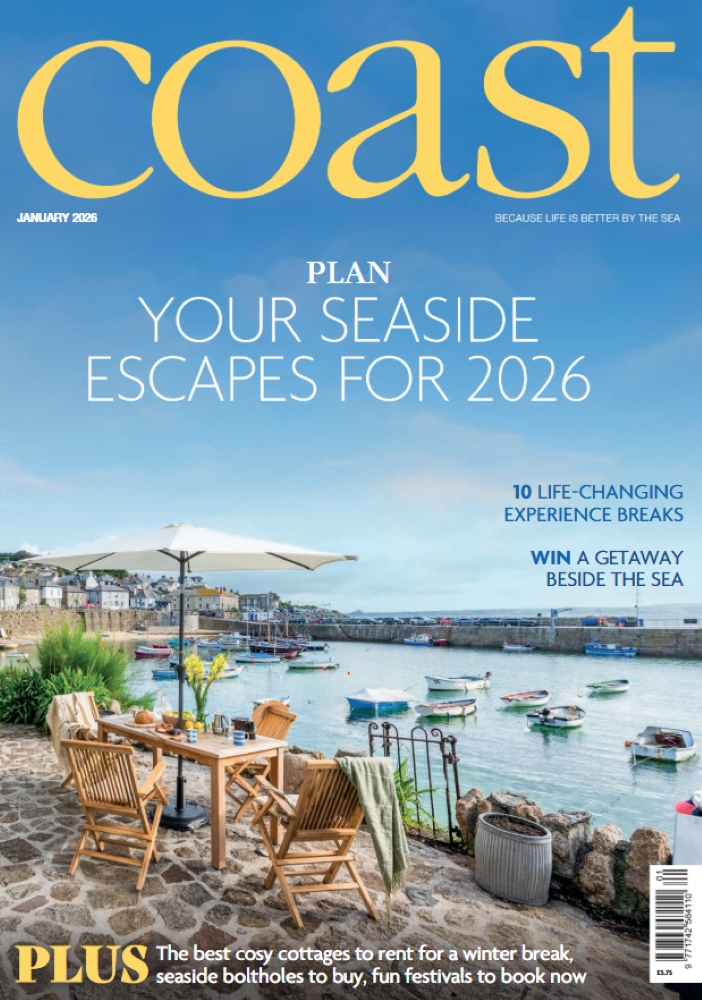Blending Japanese minimalism with Scandinavian soul, Suki is a design-led retreat above Whitsand Bay, Cornwall, that invites you to slow down, soak up the salt air, and reconnect with nature
Interview Susie Atkinson
Hidden among the salt-washed grasses of Tregonhawke Cliff, a discreet footpath leads to a home that seems more discovered than built. Suki is no ordinary cabin. Inspired by Japanese tea houses, shaped by Scandinavian simplicity, and perched high above Whitsand Bay’s caramel sands, this is a retreat with soul.
Phil Thomas and his partner Paula weren’t looking for a grand design – rather, they wanted an opportunity to create a sanctuary. ‘It started as a bit of a retirement plan,’ Phil explains, ‘but we ended up building it more for us. Somewhere to relax, reconnect and to be by the sea.’

They discovered the plot almost by accident while exploring unique sites across Cornwall. What stood there wasn’t much – a timber shack with three impossibly small bedrooms squeezed into 50 square metres. But what it did have was unbeatable: a freehold cliff-edge location with jaw-dropping, 180-degree views stretching from Rame Head to the Lizard Peninsula. ‘The view was everything. It just called to us. I love being by the sea. It just makes me feel more relaxed,’ says Phil. ‘It’s that sense of space, of being connected to something bigger – it clears your head.’

Handmade interiors
The design brief was clear and simple: maximise the view, minimise fuss. Drawing inspiration from Japanese and Nordic design, Phil helped craft a structure that blends almost invisibly with its surroundings. The exterior, clad in charred timber using the Japanese shou sugi ban method, is
both weather-resistant and striking.
Inside, the palette is natural and muted: soft pink clay plaster walls, bespoke plywood cabinetry washed in translucent tones, and furniture that curves to frame the horizon.



Almost everything is handmade. ‘We had a brilliant carpenter who used to be a boatbuilder,’ Phil says. ‘He made the bed, the bath plinth, all the built-ins – even the bathroom vanity unit. It’s all tailored to fit the space perfectly.’ The effect is calming and cocoon-like, part Zen, part Scandi snug.
But it’s the sea that takes centre stage. Glass doors disappear into the structure, opening up the corner of the living space. You can sit by the wood burner or soak in the bedroom’s stone bath and feel like you’re floating above the Atlantic. ‘There’s something about being up here,’ says Phil. ‘You see the ships pass by, the surfers below, even the occasional dolphin. One guest even spotted a comet.’
Even the bath offers a view. Raised to window height, with a skylight above, you can soak while stargazing or watch the waves at sunset without stepping outside. And when you do venture out, the terrace – a sweeping black deck shaped like a ship’s sail – is another perfect perch. ‘We didn’t want to fight the elements,’ Phil says. ‘We wanted to be immersed in them.’

Suki may be tiny in footprint, but it punches above its weight in detail and atmosphere. Every furnishing, from antique Chinese baskets to the low-slung, curve-hugging sofa, was chosen to reflect its surroundings and ethos. ‘It was actually hard to find things that worked,’ Phil admits. ‘We bought a different sofa that looked right, but when I sat on it, it wasn’t comfortable. So back it went.’
There’s no paint on the walls, just breathable clay plaster that changes shade with the light. The floors are reclaimed terracotta tile. Energy comes via an air source heat pump, and the glazing has solar treatment to prevent overheating. Even the charred timber is eco-friendly, using a product called Kebony, which mimics hardwood without the environmental cost.



Peaceful seclusion
Then there’s the setting itself. Getting here isn’t for the faint-hearted. ‘When we were building the house, we had to carry everything – windows, timber, even the bath – by hand down a steep coastal path,’ Phil says. ‘The concrete base was the only thing that came in by pump.’ But it was worth it. Below the house lies one of Cornwall’s most spectacular (and least discovered) beaches. ‘It’s vast, unspoilt, and you can usually find your own patch of sand,’ Phil says. ‘There’s a surf school, too. We were bodyboarding there just the other morning.’

You can reach the beach in under 10 minutes, though it’s a steep climb back. The sense of seclusion is part of the magic. No roads, no street lights. Just sky, salt air, and the sound of the sea. ‘We feel more connected here,’ Phil says. ‘More relaxed. It’s hard to describe. But you sit on the deck or sink into the hot tub, and you just let go.’
Though Suki was originally conceived as a part-time escape, life’s demands have kept the couple from using it as often as they’d like, and they have now opened it up as a self-catering holiday let. ‘I think it speaks to what people are looking for now – stillness, simplicity, and a closer relationship with nature.’

And perhaps that’s the point. Suki isn’t just a beautifully designed house – it’s a reminder that less really can be more. That even in a small space, you can create a simple, calm environment where you can just breathe, listen to the waves, watch for dolphins, or even spot a comet.
To find out more about Suki or book a stay, go to uniquehomestays.com/self-catering/uk/cornwall/whitsand-bay/suki.








